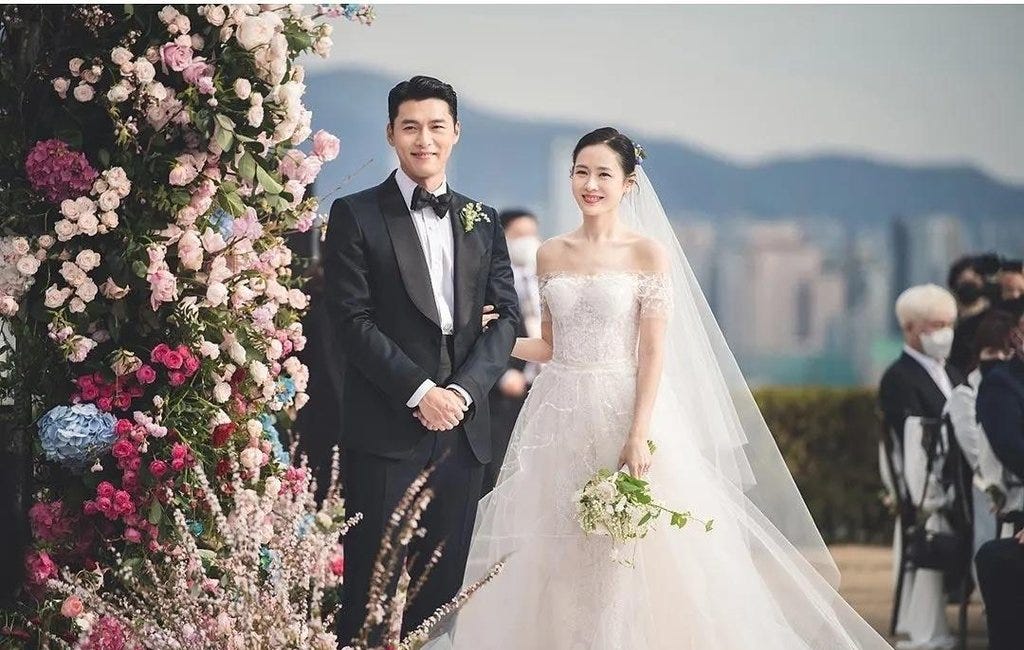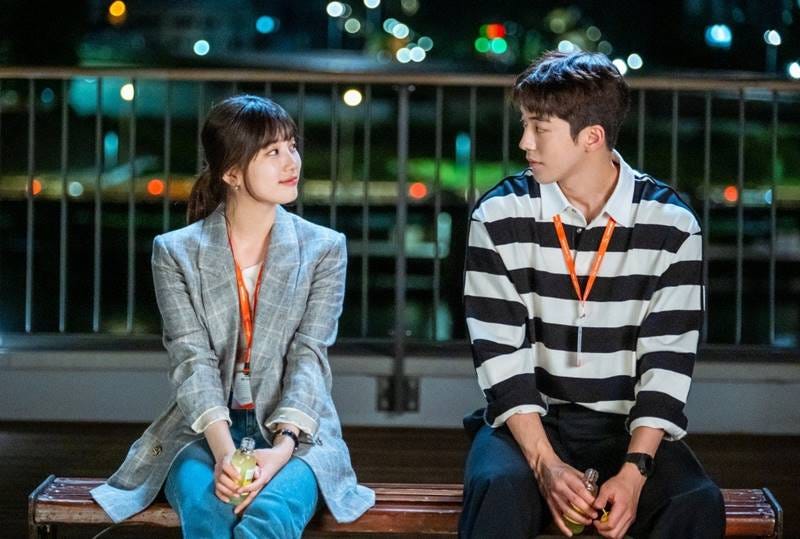Kim Seon-ho steals the show in “Start-Up”
스타트업
☆☆☆ (out of ☆☆☆☆)
Seo Dal-mi (played by Bae Suzy)
Nam Do-san (played by Nam Joo-hyuk)
Han Ji-pyeong (played by Kim Seon-ho)
↑Note: Korean names denote the surname followed by the given name.
Moreso than any series in recent memory, “Start-Up” has a second male lead (Kim Seon-ho, “Hometown Cha-Cha-Cha”) who is so charismatic that his storyline often overshadows that of the very handsome lead (Nam Joo-hyuk, “Twenty-Five Twenty-One”). But it’s important to remember that the arcs for both men revolve around the leading lady: Suzy (“Doona”).
After their parents divorce, Dal-mi (played by Bae Suzy) stays with their idealistic father, while her older sister, In-jae (portrayed by Kang Han-na), moves to the U.S. with their mother and rich stepdad. The siblings reunite in their 20s. In-jae is now an accomplished businesswoman backed by her stepfather’s wealth. Meanwhile, Dal-mi has a lot of ideas, but no money to follow through. She colors her raggedy shoes with black marker to give them the appearance of being new.
Inevitably, the sisters will end up competing against each other to launch their own tech start-up companies. There will be mixed (competitive) signals, but the siblings eventually will come to a better understanding of what each went through after their family splintered.
Ultimately, as Dal-mi’s fractured family comes together, “Start-Up” reinforces the idea that no matter how broken a family is, the ties remain – for better or worse.
Kim Joo-hun is sympathetic as the girls’ father. He portrays an office worker whose ideas are easily dismissed at work. He eventually quits his job to realize his dream of being his own boss. This move costs him his wife. Early on, the girls’ mother is presented as confrontational and money hungry. But when you view their life realistically, someone had to earn money to support the family. She didn’t work outside the home. And re-entering the job market as a middle-aged woman who has been out of the work force for a decade would be nearly impossible in today’s South Korea.
The second male lead, Ji-pyeong (portrayed as a child by Nam Da-reum), comes with a heartbreaking storyline. While still a high school student, he aged out of the orphanage[1] he lived in. They sent him off with about $1,700. Though that may sound like a lot of money, it won’t cover more than rent and some food for a month or two.
Smart and industrious, he is stunted by the laws. His age prevents him from signing legal documents or even opening up a bank account by himself. When he meets Dal-mi’s grandmother (beautifully portrayed by Kim Hae-sook), she feeds him and gives him a place to sleep. And, eventually, she asks him to befriend Dal-mi — not in real life, but as a penpal. Not wanting to use his own name, Ji-pyeong picks the name Do-san after seeing a photo of the real-life Do-san and his parents in the newspaper after he won a math competition.
Years later, Dal-mi wants to find Do-san. Can you guess what happens next? Of course you can.
There is so much unnecessary drama about Do-san pretending he was Dal-mi’s penpal, and Ji-pyeong not wanting to tell the truth, and Dal-mi’s grandmother wanting to reveal all and simultaneously remaining quiet. Why? Because no one wants to hurt Dal-mi.
I kind of felt like these are the same type of people who keep the Santa Claus or Easter Bunny myth going for years beyond what’s healthy. They should’ve ripped all the lies off like a bandage early on and told her the truth.
But with all that said, this series was also delightful in so many ways, especially when it deals less with the love triangle and more on the familial relationships.
(There’s more in the Spoiler Alert below.)
🔺 PAID SUBSCRIBERS 🔺
I’ll be sending an email invitation in the upcoming days for a ZOOM chat session. It’ll be for 30 minutes. (If we’re extra chatty that day, I can extend it to maybe 60 minutes-ish.)
Airdates: Sixteen hour-long episodes aired on tvN from October 17 to December 6, 2020. (I watched this on Netflix in the U.S.)
Footnotes:
[1] Though the words orphan and orphanage are often used in K-dramas, many of the children are not technically orphans. They have biological parents who move them into child welfare facilities for a variety of reasons. They may be too poor to raise another child, or the baby may have been born to an unmarried mother (which isn’t acceptable in Korean society).
Prior to 1991, when couples divorced, the man almost always won custody of the children. Why? Because it was a cruel custom based on the man continuing his bloodline and name. In some cases, this was merely a legal win for the man, who didn’t want to raise the child himself. (Same for some women.)
Children were/are sometimes dropped off at orphanages to ensure that divorced men and women could remarry without burdening their new spouse with a child from a previous marriage. (This repugnant theme is part of the story arc in “Weightlifting Fairy Kim Bok-Joo,” which also stars Nam Joo-hyuk.)
“When Life Gives You Tangerines”: Honestly? I had meant to have my review of that K-drama out by now. But I’m still working on it. This one is a balancing act, because there are some elements of the show that hit so close to home that I’m not sure if I will include those elements. Or, if I do, how I will do so. However, so many subscribers have asked for more content about Kim Seon-ho’s work, so this review is in response to that. (He’s also wonderful in “Hometown Cha-Cha-Cha.”)
Spoiler Alert: As much as I was rooting for the second lead, the fact is that he didn’t do much to help his cause. When Do-san moved to San Francisco for three years to work for a tech company, Ji-pyeong didn’t reveal his feelings to Dal-mi. He didn’t give her the chance to fall in love with him. I get unrequited love. But a person can’t expect someone to fall into their arms if they don’t reveal their own feelings. And, if per chance he did — though the series doesn’t depict any such revelation — then there’s his answer. She’s not interested in him. And that has nothing to do with her feelings for Do-san, but her lack of romantic feelings for him.
I would’ve loved to have seen more of a storyline between Dal-mi and her father, before he died. He was a dreamer, who lacked the funding to realize his genius early on. In some ways, he reminded me of my father, who had so many ideas (and even patented some of them), but didn’t live long enough to see them into fruition.
(This is Kim Joo-hun’s fourth K-drama of 2020 — “Dr. Romantic 2,” “It’s Okay to Not Be Okay,” “Do Do Sol Sol La La Sol” — and he was wonderful as the dad.)
I loved how (the child version of) Dal-mi found simple pleasures in life, like requesting that her dad bring home fried chicken on payday. It broke my heart when In-jae said she was sick of having to pretend to be grateful for such basic treats, because it reminded me of how others may have thought it was silly of to get excited over…chicken.
I used to be so happy when my mom brought home Kentucky Fried Chicken or Chinese carryout on her way home from work. To me, that is a fond memory I still cherish, because getting carryout wasn’t as commonplace then as it is today. As an adult, I appreciate even more how my parents spent their hard-earned money on these treats so that we didn’t feel we were missing out on things that were so normal for many of our school friends.
© 2025 JAE-HA KIM | All Rights Reserved
K-DRAMA INDEX

These are some of my reviews and essays about K-Dramas (and also Korean films and other Korean-centric projects). You may also read more about my take on Korean pop culture in outlets such as Rolling Stone, Mashable, Victoria & Al…







